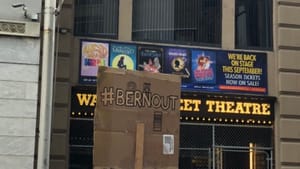Stay in the Loop
BSR publishes on a weekly schedule, with an email newsletter every Wednesday and Thursday morning. There’s no paywall, and subscribing is always free.
Time warp on Walnut Street
What I learned about leadership as a Walnut Street Theatre apprentice

When last week’s Protect the Artist protest co-organizer Katherine Perry began to speak to the gathering crowd on the lawn beside the Liberty Bell complex, the Independence Hall clock tower chimed 6pm. “Time’s up, Bernard!” a protester yelled into the momentary silence.
Covering this story—sparked when Walnut president and producing artistic director Bernard Havard sent a cease-and-desist letter to Philly actor Jenna Pinchbeck—sends me back in time. I was in the last weeks of my bachelor’s in theater, wondering what was next. A teacher had encouraged me to apply to the Walnut’s famous apprenticeship program, and I had had a series of interviews.
I was in the parking lot of my bank, where I had a checking account, but very little idea of how to put anything in it. My flip phone buzzed with one more call from the Walnut. I was the new public relations apprentice, with a stipend of $300 a week. I was ecstatic.
Apprentice days
This was so long ago that we were still mailing paper press releases. That was part of my job: printing the stacks of releases, assembling all the envelopes, running them through the postage machine, and hauling them to the post office on 9th Street in a wagon we kept for the purpose.
As the months went on, I learned to write the releases, as well as copy for the playbills. I wrestled actors’ bios down to 50 words. I helped assemble the lobby headshot displays, organized archives, printed up reviews from the local press and slid the hard copies into the executives’ mail boxes. I learned to call up local media and sat in on sponsorship meetings. I fetched coffee. I worked evening and weekend events both inside and outside the theater (no additional pay or overtime).
I got to know other apprentices—acting, marketing, literary (that was my top choice, if we’re being honest), education, development—I’m still in touch with many of them. And to this day, I remember how I felt when Havard or managing director Mark Sylvester was in the room. I felt as if I didn’t exist.
I got lucky
Granted, I wouldn’t have spoken to them any more than seaweed speaks to a galleon in full sail. On opening nights, we apprentices camped on the stairs above the tide of subscribers, packing the narrow lobby from the west side to the marble feet of Edwin Forrest. But the waters parted for Havard and Sylvester.
I’d occasionally draft correspondence for them, but that didn’t mean they would say hello. I remembered their apparent detachment over the years, especially as my immediate supervisors at the Walnut remain my friends, supporting my work from afar and sending holiday greetings to this day—not because I’m an editor (just as my fellow apprentices are now educators and writers and parents and artists and administrators), but because that’s a kind and courteous way to treat your colleagues of any age, and my supervisors acted on that long before my own career amounted to anything.
I was not the only former apprentice in the crowd that stopped outside the Walnut on Friday night, but there was no sign of life from inside the theater. And listening to testimonials gathered from former Walnut employees over the last week—claiming harassment, body shaming, excruciating politics of blame, and deliberate efforts to keep dark-skinned people, fat people, and disabled people off the stage, it sounds as if I was lucky to be ignored.
Learning from Bernard
I had a meeting with BSR’s new summer intern a few hours before the protest, and I appreciated the timing. Havard and Sylvester influenced my leadership style, but not in the way they meant to.
Unlike the Walnut executives, I don’t hold anyone’s career in the palm of my hand (nor would I want to). But in the 15 years since I started my apprenticeship, I’ve worked my way into a role with responsibility and a voice in Philly’s cultural community, curating arts coverage and helping to keep conversations like this one in the public eye.
So here’s what the Walnut executives taught me, then and now. When you ignore or disparage people newer to the field, you ignore and disparage the future.
If I’m lucky enough to make it a few more decades into my career, as others continue to mentor me, I’ll keep training writers in the skills and practice and ethics of storytelling and good arts journalism. And just as important, the writers coming up behind me will learn that their voices matter—their cultures, their experiences, their interests. They deserve to have a voice, a voice they in turn will use to strengthen and diversify journalism for the ones coming behind them.
Truths and time
I believe local arts workers are telling the truth about their experiences at the Walnut. The Walnut’s top leaders think they have a license to treat others cruelly while wrapping themselves in the mantle of a cultural institution touted as both historic and progressive. In reality, these executives are stuck in time, refusing to see people who have worked for the Walnut Street Theatre Company as the leaders of the future—leaders who would have strengthened and diversified the Walnut, instead of taking a megaphone to the theater’s locked door, telling Havard and Sylvester that their time is up.
Image description: A view from the back of the crowd at a protest outside the Walnut Street Theatre. A gold-lettered sign saying “#BernOut” is held up with the Walnut Street Theatre marquee in the background.
Sign up for our newsletter
All of the week's new articles, all in one place. Sign up for the free weekly BSR newsletters, and don't miss a conversation.

 Alaina Johns
Alaina Johns